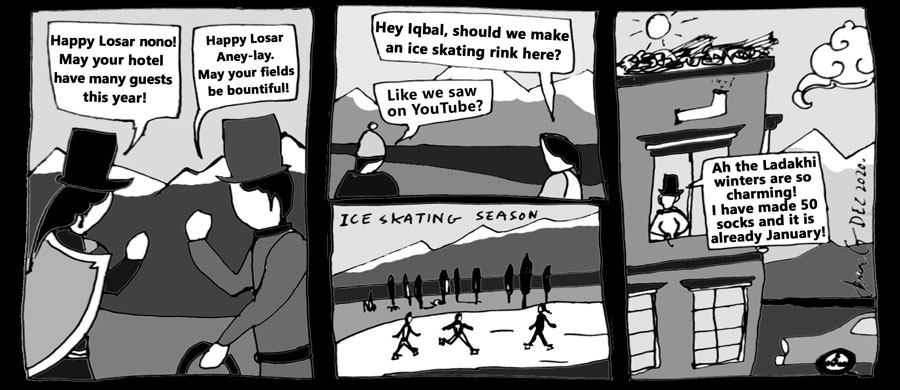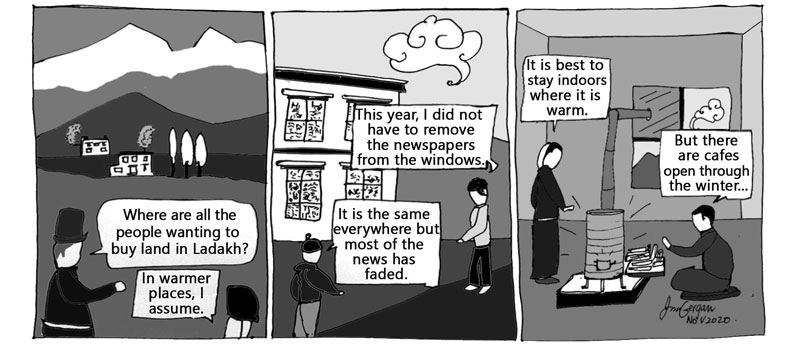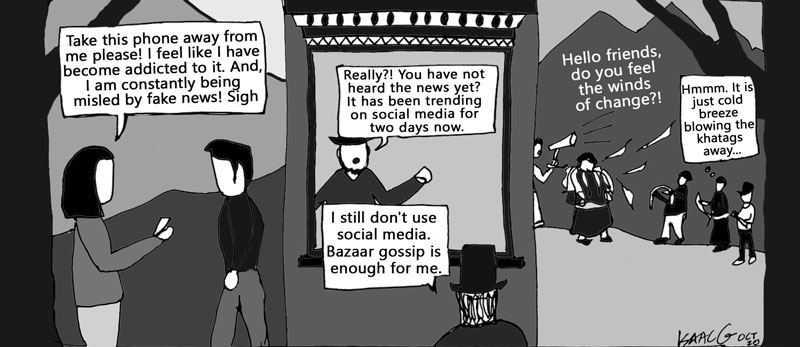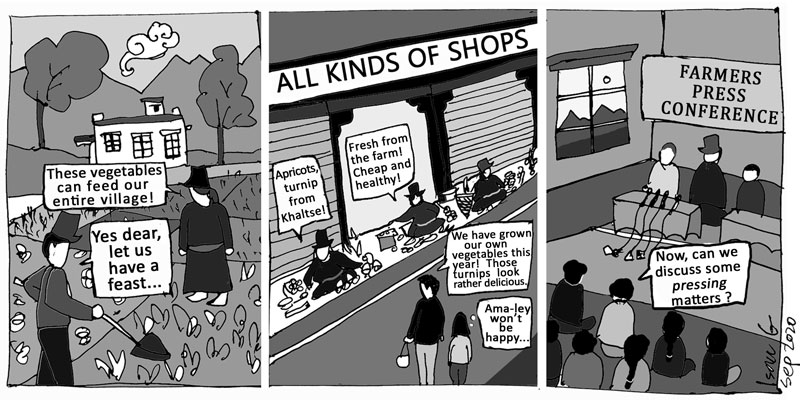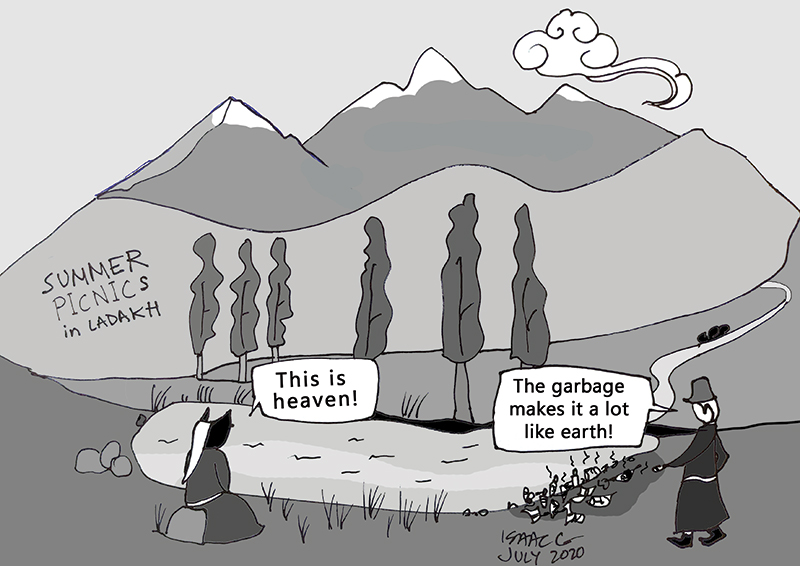Author: The stawa team
Samzo
New Delhi Diary – November 2020
The new work culture
Ever since the novel coronavirus spread its tentacles across the globe, a large number of people have been asked to work from home. In the beginning, it was a big thrill and a reason for celebration. But the joy of working from home seems to have faded away!
A private TV channel has reported that those who work from home “are not happy to be home all the time”. They feel isolated, and boredom, despite in a family environment, has hit them hard. At least 11% of such people have gone into depression, and 74% feel that they are “suffering from stress or anxiety”.
Many of them are sad that they are not able to work smoothly due to technical glitches and patchy internet services at home. And others have complained that they “have lost their creativity” which comes by being in an office environment where one can have discussions with colleagues over a cup of tea!
The lingering effects of COVID-19
It looks like we are going to live with COVID-19 for a long time and most of us have made it a part of our daily lives. We hear dreadful reports of the effect of the novel coronavirus. Many of those who have contracted the virus suffer serious impacts. There are many who recover from the disease but continue to suffer from various lingering medical and psychological ailments. Some of these people, reported from various parts of the planet, are no longer the same individuals. They suffer from memory loss, speech impairment, regular bouts of dizziness, and no longer feel like their normal selves.
One such person in India was discharged after he was ‘cured’ of COVID-19 but is no longer his previous self. He can’t talk the like he did but he can sing as well as he did in the past. He fumbles and has lost his coherence. Doctors say that the ability to speak and sing are controlled by separate parts of the brain. He is said to have lost his ability to speak due to a clot in his brain. Similarly, there are reports of people who have recovered completely from COVID-19 only to have a heart-attack some few days later.
The ‘data mining’ menace
The words ‘data mining’ has lately become a very popular topic for discussion on TV channels or in private conversations. That is mainly because ‘data mining’ has played havoc on people’s privacy. Data phishing is now become rampant as companies use your personal data for advertisements and other forms of marketing.
And then, we have reports that banks and companies that have our data sell it for hefty amounts. So much so that many social media users have started closing their accounts for fear of such unscrupulous activities.
A little birdie states that data is gold, and that social media giants are “playing this game like never before.” And she adds, privacy is a “myth” on social media and these companies have emerged as the biggest spies around!
The aerotropolis wonder
The word ‘aerotropolis’ is not really a familiar or common word for most of us. Yet, one has heard it fairly regularly in the last few years. The reason: India too will have a couple of aerotroplises over the next few years. One of them will be established in Uttar Pradesh. The first aerotropolis project in India is coming up in Durgapur, West Bengal.
What is an aerotropolis? It refers to a super-city, which is a level above a metropolis. An aerotropolis is designed to provide all kinds of luxurious business facilities to busy business travellers who cannot afford to waste time travelling to distant hotels in a city. Such cities have top-class hotels, clubs, gymnasiums and convention halls. They also have entertainment centres including cinema theatres and the like.
Tailpiece:
A young girl was talking on the phone for about an hour.
Father: Wow, how come you stopped talking so quickly? Normally, you speak on the phone for hours!
Girl: Oh no, dad, that was a wrong number!
By P. P. Wangchuk
P. P. Wangchuk is a New Delhi-based editor-at-large, columnist and professional speaker
Samzo
Why humankind is suffering
Have you ever wondered why stray animals that eat from the garbage bin rarely fall sick? Or how our pets who consume the family’s leftover food manage to remain hale and hearty? In contrast, we have been washing our hands, using different kinds of sanitisers, wearing a mask and eating fresh and clean food. Despite this, we seem to remain at constant risk of all kinds of pathogens. Why are humans so weak? Or, what has made humans so weak? The reality is the exact opposite. Humans are fairly strong but we suffer due to our behaviour and actions.
In the wake of the COVID-19 pandemic, it’s definitely a good idea to maintain a very high degree of hygiene. I have now learnt to trust the wisdom of the famous Ladakhi word: Lobs, which means “getting used to”. For instance, elders often say, “Don’t give boiled water to your children all the time or they will get used to it.” Most of us have survived on tap water and stream water while our children have grown up on filtered and boiled water. Similarly, the elders also say, “Oh, don’t wear that feather jacket. What will you wear in the winter?” In the same vein, they would also say, “Oh, don’t keep that baby so clean all the time, let it play in the dirt. It will make the baby strong.” Yes, diarrhoea and similar infections are most common among children who maintain a high level of hygiene. I have noticed that children from Europe and other developed countries are very susceptible to diarrhoea and contact infections such as Hepatitis A when they visit India.
Our immune system is very strong and dynamic. Though it faces challenges tackling some pathogens, our body is able to deal with most pathogens and provide immunity cover for the rest of our lives. Over several generations, we have developed an innate and natural immunity for many pathogens. In this regard, the novel coronavirus is different as it is a new virus that may have come from wild animals or may even be “artificial”…who knows!
This year has been exceptional in many ways. Besides the COVID-19 pandemic, other diseases seem to be lying low. For instance, we didn’t have diarrhoea during the diarrhoea season. Similarly, we always get several patients with pneumonia or the common cold in the hospital but the numbers have been much lower this year. In fact the incidence of most infections seems to be at the lowest I have ever seen. I cannot help but wonder what happened to the never-ending line of children in our OPD and the clinics. And what happened to waterborne diseases such as diarrhoea and jaundice?
We contract most infections due to our behaviour and actions. Our body has evolved to fight off most infections. However, most epidemics are caused by pathogens that originated in nonhuman animals. These pathogens do not cause their host animals any harm and become virulent when they manage to jump to humans who do not have any natural immunity to such new viruses. Similarly, we too have pathogens in our body that do not harm us but can cause infections in other species that lack immunity to them. Such ‘good bugs’ help us remain healthy. Through the course of history as we started domesticating and consuming various animals, many of their ‘good bugs’ started mutating and crossing over to humans.
A good example of this process is measles, which is caused by the measles virus. Measles is a common infection amongst children. It has caused epidemics and claimed the lives of millions worldwide. This virus is said to be closely related to the Rinderpest virus, which is a pathogen found in cattle. It is believed that the smallpox virus shares many similar characteristics. Smallpox has wiped out whole civilisations. Most researchers assume that animal domestication and their consumption that started around 6,000 to 10,000 years ago, created conditions that facilitated the emergence of smallpox. Similarly, a virus that causes common cold-like symptoms in humans originated in poultry and may have crossed the species barrier around 200 years back according to an article in the Journal of General Virology. An international team of scientists traced the origins of human tuberculosis to early humans when they lived in hunter-gatherer groups in Africa some 70,000 years ago. Similarly, chimpanzees in West Africa have been identified as the source of the HIV infection in humans. It is believed that the chimpanzee version of the immunodeficiency virus (called Simian Immunodeficiency Virus or SIV) was transmitted to humans and mutated into HIV after humans hunted these chimpanzees for meat and came into contact with their infected blood. Over decades, the virus spread across Africa and the world beyond. Other diseases such as Plague, Brucellosis, Lyme diseases, and Rabies have a similar history.
This seems to be true for the novel coronavirus too. We know that it originated in a wet market in Wuhan where a wide variety of wild animals like snakes, mongoose, bats, and wild cats were slaughtered for consumption. It is believed that the novel coronavirus has a zoonotic origin as it has a close resemblance to the bat coronavirus. However, there are some claims that pangolin may have served as an intermediate reservoir for the virus as it passed from bats to humans.
Overall, it seems we are suffering largely because of the suffering we have inflicted on animals and other life-forms. Although humans are physically small, our brain is disproportionately large and has enabled us to control the whole planet. In fact, many species have become extinct due to human activities.
Humans have long consumed other animals as food. This may have been relatively safe when these animals were raised in the backyard. However, this is now being done on an industrial scale and has become inhuman and unethical. In the last 50 years, while the human population has doubled the amount of meat being consumed has tripled in addition to the tonnes of fish being harvested. Intensive farming operations housing tens of thousands of animals in close quarters serve as ideal incubators for disease transfer of infectious agents from animals to humans, antibiotic resistance, food-borne illness, and the emergence of new viruses like the novel coronavirus. Antibiotic resistance, stems from the use of antibiotics to promote growth and suppress disease in confinement operations and poses a serious health concern. In fact a majority of the antibiotics produced are consumed by animals that are then consumed by humans.
Furthermore, the ever increasing demand for food has shifted the focus from ethics to efficiency. Animals are now being slaughtered by machines and through electrocution, which are painful. At the same time, many industrial farms employ procedures such as de-beaking, de-horning, de-tailing, castration, overcrowding etc. to increase their meat output. However, these practices cause physical stress to the animals and there is growing concern that meat produced in such facilities is laden with various stress hormones in addition to various pathogens and antibiotics.
By Dr Spalchen Gonbo
Dr Spalchen Gonbo is a Paediatrician based in Leh.
Samzo
New Delhi Diary September 2020
The currency of the future?
Will ‘crypto-currency’ be the currency of the future? The world economy is taking hits repeatedly at short intervals and the monetary system has become notoriously volatile. In light of this, some European and American economists have started questioning the security of the financial system in its present form.
As a result, all major economies have now started taking the crypto currency ‘business’ a little more seriously even as they tread cautiously till they understand it better. However, there is no denying the fact that crypto currency is here to stay and is doing ‘big business’. A serious issue that has been raised, of late, particularly in the western countries, is: Can it be a security threat? The answer seems to be yes, it can become an ‘uncontrolled menace’.
If you are not banning it, as no major country has shown any inclination to do, then there is a need at least to have a law to control and regulate it. Without that kind of safeguard, crypto currency is going to pose a ‘volcanic danger’ especially for democratic and liberal countries like India and America.
A season of twin blessings
The denizens of the city are grateful to nature for its ‘twin blessings’ this year—the summer was difficult but not very hot, followed by a good monsoon. The city, but for a day or two in May when the temperature soared to 47 degree Celsius, experienced tolerable temperatures for the rest of the summer. And then there was ample rain in the months of July and August. It rained almost every other day but very gently, which ensured that the city did not experience any problems. By the end of August, the weatherman reported that the city had received more than its full share of rain this year.
One fails to recollect such a good summer and rainy monsoon in the recent past. A friend says we are lucky that we had a good summer/monsoon in the city this time while many places in the country and abroad experienced abnormally high temperatures and devastating floods.
Milton lost and regained!
The last time I had read John Milton’s epics, Paradise Lost and Paradise Regained, was way back in my college years. Till recently, I had some vague ideas of their themes, and the fact that they were ‘difficult-to-understand’ books remained etched in my mind.
Now that I have read fresh editions of the books, I was quite excited to realise that, this time around, I thoroughly enjoyed reading them and also managed to understand them to a large extent. And, the credit for this goes entirely to my ‘accumulated knowledge of poetic literature’ over the years.
Most critics agree that John Milton is perhaps the most important figure in English literature after Shakespeare. Both his books deal with serious issues of good and bad, moral and immoral, life and death etc. Paradise Lost is, for instance, about man’s disobedience and revolt, sin and innocence etc. The main theme of Paradise Regained is Christian heroism with the character of Jesus Christ portrayed as the epitome of Christian glory. As such, the book is centred on enduring faith in God, the power of prayer, and spirituality.
Digital reading gets a boost
Like many of my friends, I too stopped reading physical newspapers with the onset of the novel coronavirus pandemic. This led to a natural shift to reading digital newspapers. I must say that digital newspapers do not give one the joy one experiences when reading a physical newspaper. Maybe, I am yet to develop a ‘taste’ for digital newspapers!
However, one thing that I do like about digital reading is that you have the option of reading any newspapers anytime, anywhere, and with great ease. And, it does not pinch your pocket too much either!
Tailpiece:
Teacher: What is the longest word in the English language?
Student: ‘Smiles’ as there is a ‘mile’ between the first and the last letters!
By P. P. Wangchuk
P.P. Wangchuk is a New Delhi-based editor-at-large, columnist and professional speaker
Vaccines do not save lives…
It is said that only fear brings people together. And, when the fear is that of death, the world will surely come together. In the wake of the COVID-19 pandemic, we have seen the world unite to develop a vaccine against the disease. Everyone seems to be waiting eagerly for a vaccine that will prevent COVID-19. Even people who otherwise oppose vaccines and those who regard vaccinations as a marketing conspiracy are now pinning their hopes on various trials underway.
However, this unity has turned into a contest, which is reminiscent of the race to reach space. And this time too, Russia seems to have won with its Sputnik-V vaccine for COVID-19. The word ‘sputnik’ means ‘fellow traveller’ in Russian. The word holds a special place in Russia’s history after Sputnik became the first artificial satellite that was successfully launched into space. At the time, Sputnik was way ahead of its time just as Sputnik-V is now. It has left the world, especially Russia’s Cold War rival, the U.S. of A, in a state of shock.
While the competition to master space flight was indeed a race, the development of a vaccine should not be treated as a race or contest. Many compromises are being made in this race to develop the first vaccine for COVID-19. According to various reports, Sputnik-V has not even completed its Phase 3 trials when it was declared a success. Many countries are bound to reject it till it undergoes more rigorous tests. The UK has already said it will not use Russia’s vaccine at the moment. Safety and effectiveness are key components of a vaccine. Most vaccines that are currently being used have taken anywhere from five to 10 years of development and have undergone five phases of testing.

We seem to have forgotten an important principle of medicine. Vaccines are but one strategy to prevent to prevent a disease. We must treat the COVID-19 vaccine as one of many approaches to control the disease and make it our only strategy. There are many different measures and non-pharmacological interventions to control the spread of the virus that can be implemented immediately but remain neglected. Furthermore, in the race to find a vaccine for COVID-19, we have started ignoring all other diseases and routine vaccinations that are putting people at unnecessary risk.
Let me put this in perspective. The seriousness of a disease is calculated in terms of mortality or death that it causes. I pulled up statistical data from the websites of World Health Organization and Medscape for diseases that have a relatively high mortality rate for which vaccines are available but are not mandatory. This includes Varicella (4.2 million complications and 4,200 deaths worldwide each year), Influenza (three to four million and up to 500,000 deaths worldwide each year), Hepatitis A (7,134 deaths in 2016), Pneumonia (2.56 million deaths in 2017), Hepatitis B, which is regarded as 100 times more infective than HIV and causes around 884,000 deaths each year. A total of 570,000 women were diagnosed with cervical cancer worldwide in 2018 and it claimed the lives of 311,000 women that year. Then there are serious bacterial diseases such as meningococcal meningitis whose mortality rate can exceed 50% if left untreated. Vaccines are available for all these diseases but most people do not receive them as they are ‘optional’ in many countries including India. Most people don’t regard these vaccines as necessary as the deaths caused by them are not as ‘visible’ as COVID-19. Many vaccines currently being administered such as BCG and MMR are said to provide a degree of protection against COVID-19. Similarly, the flu vaccine Pneumococcal also seems to help prevent some complications of COVID-19.
The deaths attributed to COVID-19 are visible as we are in the midst of a pandemic. It may soon become endemic or may vanish altogether. Even now, the deaths caused by COVID-19 are less than the number of people who die in accidents, which in 2018 was estimated to be around 151,417 in India alone. There is a common misconception that COVID-19 is lethal in the absence of a vaccine. This is simply not true. So far, the highest mortality rate for the disease has remained below 3%.
Take for instance the case of the Hepatitis B vaccine, which is known to prevent certain cancers of the liver. It has now been included in the Universal Immunisation Programme and every new-born in the country is receiving this vaccine. However, most adults and elders in Leh district have not been immunised with this vaccine. I specifically mention Leh district rather than Ladakh as a whole. The reason is that Kargil recently managed to vaccinate every person in the district. The end result is that most adults in Leh district have not received the Hepatitis B vaccine despite its high prevalence in some parts of Changthang.
I am not suggesting that we should stop looking for a vaccine, stop taking COVID-19 seriously or become complacent. However, safety and effectiveness are two most important qualities of a vaccine. A vaccine cannot be produced overnight. Interestingly, I recently discovered that vaccines have also been a part of disease prevention in Sowa Rigpa. In allopathic systems, vaccines undergo five steps of development. I would argue that we should not rush the process of developing a vaccine and invest in multi-pronged approaches for disease prevention. And most importantly, we must not neglect other diseases that are still infecting people and claiming lives for which we do have vaccines and treatment protocols. Vaccines are said to be humankind’s most important invention after the wheel. However, we seem to have forgotten a very simple principle: Vaccines do not save lives, vaccinations do.
By Dr Spalchen Gonbo
Dr Spalchen Gonbo is a Paediatrician based in Leh.
Samzo
New Delhi Diary – August 2020
The joy of e-reading
Wow, what a change has come to pass, thanks to the COVID-19 pandemic! For over four months now, I haven’t been able to have the pleasure of visiting my favourite markets to buy new books. As a result, I had no alternative but to choose the option I have been resisting for a long time: e-reading.
Now that I have been forced to take up e-reading, I am happy to say that I got used to it in no time. It has helped me in several ways: E-reading is kinder on my pocket as it is much cheaper, and it is very convenient to read anytime, anywhere, and does not require any extra space as you can use your smart phone.
Another advantage is that one can read it in bold letters, which means one does not need spectacles to read as is necessary for some printed books. And lastly, one can also derive some happiness from the fact that a digital book can’t be ‘lost’ to a friend or a relative who, in the case of printed books, pretends to ‘borrow’ them for a week or so, but never cares to return them! One hesitates to give them a gentle reminder because that is generally not taken kindly. It is quite likely that you lose not only a precious book but also a friend!
The mysteries of nature
How many of us, and how many times, notice the strange things that happen around us in the world. I guess most of us miss them because of “various and strange reasons.”
The other day, I was watching an international TV channel non-stop because it was broadcasting a programme on the bizarre and ‘unlikely’. One of such ‘unlikely’ things was a ‘miracle boy’ who was born in Germany in the first week of July with three eyes. The third eye was on his forehead and in perfect symmetry with the other two to form a perfect triangle. The boy, only a few days old, looked cute, and all his eyes moved together in any direction.
And there were reports that Indian saints had predicted, a long time back, that such a ‘phenomenon’ would happen. The reports also said that many Hindus believed that the boy is an ‘avatar’ of Lord Shiva.
There can be several scientific explanations for such a phenomenon. However, it will always remain a mystery despite the numerous ‘guesses of possible’ explanations put forth by various individuals and organisations. A friend wondered if we can have such three-eyed children in the future with the help of the German child’s genes.
Good food in bad days!
The Corona days have been very harsh with normal life being put on hold. But, if one speaks about the brighter sides, there are many. For me, a zealous foodie, there is nothing more enjoyable than cooking. Therefore, one can say that, in a way, the COVID-19 times have given each of us an opportunity to cook one’s favourite food and have the best fruit cocktails. Very rarely do we get an opportunity to pamper ourselves.
At times, one follows the best recipes eagerly and ‘obediently’, while at other times, one experiments and follows one’s own imagination. As a result of such experiments, one gets the pleasure of enjoying different varieties of ‘goody-goody’ food! Each new day means a new kind of food, and one did not know what kind of food one will have the next day. That depended entirely on one’s ‘crazy mental waves’. Indeed, if there were any good time for the kind of a ‘Khao, pio, aish karo’ (eat, drink and enjoy) lifestyle, it has been the last few months. And the hope that life can be better, easier and smarter in the post-COVID-19 days, gives one more ideas for experimentation!
Tailpiece:
A: Why did the terrorist blow up his own house?
B: He was asked to work from his home due to the Corona pandemic!
By P. P. Wangchuk
P. P. Wangchuk is a New Delhi-based editor-at-large, columnist and professional speaker

